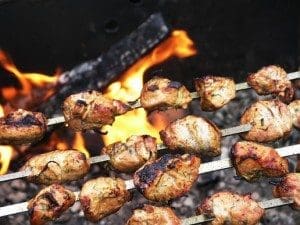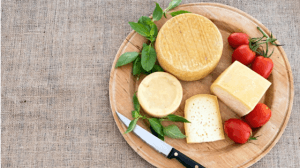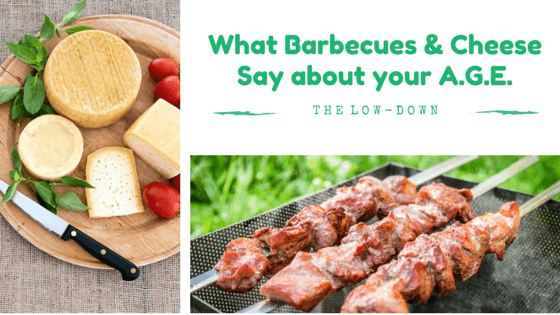Summer is the season for barbecues and picnics, which expand your food selections to include a whole new menu of crisp and refreshing recipes that are light and healthy.
Among everyone’s favorite options are grilled meats in succulent barbecue sauces, tangy marinades or alongside grilled vegetables (and while it might seem unconventional, I like to add in a good cheese plate when I’m hosting an outdoor event).
You tend to feel healthier at this time of year (after all you’re eating healthy proteins and light salads) but the truth is, the way you barbecue your meat might be increasing your A.G.E.
Before I go any further. I want to put you at ease. Barbecues will never be excluded from a healthy Meal Plan! We simply need to tweak a few things to keep our A.G.E. low.
And while I am referring to a change in your biological age (or the changes in your internal processes which make you younger or older internally) I am also referring to a specific group of compounds known as A.G.E.’s (Advanced Glycation End Products).
It sounds sciency and complicated but it’s not. It’s truly fascinating and it might just change the way you barbecue (and eat cheese) forever.
What Are A.G.E.’s
A.G.E.’s are naturally occurring compounds that form within all of our bodies. We all have a certain amount of naturally occurring A.G.E’s. It’s normal!
And while having some A.G.E.’s in our body won’t effect our health, it is the high accumulation of dietary A.G.E.’s that come from food sources that might change our biological age (and health).
External A.G.E.’s form when foods high in fat, protein and carbohydrates (such as sugars) mix together. The temperature of these nutrients plays a huge roll in increasing the quantity of A.G.E.’s
In excess they promote oxidative stress, they increase inflammation, they’re linked to chronic disease and they make you look older by breaking down collagen which is essential for skin elasticity, plumpness and glow.
What Barbecues and Cheese Say About Your Age:
 It’s not a matter of barbecuing and eating cheese that will age you, but it’s about HOW you barbecue and WHAT TYPE of cheese you eat.
It’s not a matter of barbecuing and eating cheese that will age you, but it’s about HOW you barbecue and WHAT TYPE of cheese you eat.
How to Barbecue:
The higher the temperature you cook fats, proteins and sugars, the more AGE’s you’ll produce. Grilled barbecued meat definitely counts as a high temperature protein and fat. Add barbecue sauce and you have one of the highest AGE producing foods around. Cooking meats above 225C should be minimized as an AGE defying tactic. Also the longer you grill your meat, the more AGE’s you create.
What to do when you really want to grill: Grilled meat tastes amazing. So every once in a while this form of barbecuing will most definitely take place. Yet if you take a few precautions, you’ll create an AGE defying dish.
- When cooking chicken take off the skin: AGE’s occur when the reaction of fats, proteins and sugars mix together in higher heat. By reducing fat content you’ll greatly reduce the amount of AGE’s in your food.
- The rarer your steak the better: Longer grilling time produces a greater production of AGE’s. By reducing the amount of time your steak grills, you also reduce the amount of AGE’s produced.
- Forego the barbecue sauce until after you’ve grilled: Some studies have shown that sweet sauces such as barbecue sauce, sweet and sour sauce and soybean sauce produce AGE’s, especially in high heats such as grilling. In order to greatly reduce your AGE content, dip your grilled meat in your chosen sauce after your food has been cooked. Choose rubs or spices as a variation to sweet sauces or try tart/lemon and lime sauces instead.
Barbecue on “Roast” Settings instead: These days barbecues are a wonder of complicated knobs and cooking settings that don’t just include the option to grill. By choosing lower heat settings to cook your meat, you avoid accumulating AGE’s. Opt for settings of 177C or less in order to reduce your AGE. Roasting does not eliminate the production of AGE’s but it does greatly lower them.
What Type of Cheese Should You Eat:
 All cheese is good cheese when it comes to taste (at least for my taste buds) but not when it comes to increasing your biological AGE.
All cheese is good cheese when it comes to taste (at least for my taste buds) but not when it comes to increasing your biological AGE.
Milk products in general are higher in AGEs. It isn’t fully understood whether this is because milk products are usually heated for the pasteurization process or whether its due to the higher fat content found in milk. After all milk is a perfect example of a sugar(lactose), a protein and a fat combined.
Whatever the reason might be, choosing cheeses that are lower in AGE’s will help you slow down the aging process while you simultaneously enjoy all the positive health benefits associated with cheese such as increased vitamin D, Calcium, vitamin K and other important nutrients.
Avoid Highly Processed Cheese: This form of cheese is usually found as individually packaged cheese slices. They are the easiest to slap on a burger during the barbecue process, yet they are the most likely to increase your AGE. The heat levels used to process food are high .
Pasteurized cheese low in fat: While you might be missing some of the good fats in pasteurized skim milk cheese, you’re also reducing the amount of AGE’s your body will make. While pasteurization occurs in elevated temperatures the reduction of fat needed to create AGE’s makes this a healthier choice.
Raw cheese high in fat: High fat raw cheese has avoided the temperature pasteurization process. This way your cheese can maintain it’s fats, keep it’s proteins and have less AGE’s than full fat pasteurized.
The best option to ensure you have an AGE defying summer is to vary up your food choices and the way in which you cook them. It’s only when we begin to produce AGE’s in excess that we risk chronic disease and age our cells.
